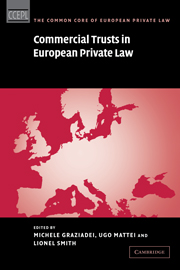Book contents
- Frontmatter
- Contents
- General editors' preface
- Preface
- Contributors to the volume
- Contributors to the case studies
- List of abbreviations
- Select bibliographies for jurisdictions represented
- Part I Setting the scene
- Part II The case studies
- Case 1 Creation and termination of the management relationship; powers of the manager
- Case 2 Investment duties
- Case 3 Conflict of interest
- Case 4 Basic insolvency situation
- Case 5 Insolvency of investment manager
- Case 6 Tracing
- Case 7 Choice of law
- Case 8 Pensions funds
- Case 9 Collective investment schemes
- Case 10 Multiple debenture holders
- Case 11 Securitisation
- Part III Conclusions
- Index
Case 4 - Basic insolvency situation
Published online by Cambridge University Press: 22 August 2009
- Frontmatter
- Contents
- General editors' preface
- Preface
- Contributors to the volume
- Contributors to the case studies
- List of abbreviations
- Select bibliographies for jurisdictions represented
- Part I Setting the scene
- Part II The case studies
- Case 1 Creation and termination of the management relationship; powers of the manager
- Case 2 Investment duties
- Case 3 Conflict of interest
- Case 4 Basic insolvency situation
- Case 5 Insolvency of investment manager
- Case 6 Tracing
- Case 7 Choice of law
- Case 8 Pensions funds
- Case 9 Collective investment schemes
- Case 10 Multiple debenture holders
- Case 11 Securitisation
- Part III Conclusions
- Index
Summary
Case
Alternative 1
Tom is a real estate agent. One of the immovables he is trying to sell is an apartment belonging to Samantha. Bill is interested in buying this apartment. To show his seriousness in entering into negotiations, Bill writes a cheque for €10,000 as a deposit, which is to be refundable if the sale does not proceed. On Tom's instructions, Bill makes the cheque payable to Tom, and Tom deposits this cheque into his own bank account. The negotiations between Samantha and Bill break off with no contract, and Bill tells Tom to refund the money. Tom, who has made no withdrawal from the bank account in the intervening time, has become insolvent. Does Bill's claim to his deposit have priority over competing claims, or is he treated as a general creditor? Would it make a difference if Tom were a practising lawyer?
Alternative 2
Tom is a travel agent. He sells tickets from various airlines to his customers. The money paid for the tickets by his customers is deposited in a bank account in Tom's name. When Tom becomes insolvent, some customers already have their tickets and some do not (and those who do not have tickets have no contractual claims against the airlines). The customers who have not been issued tickets claim back their money. The airlines claim payment from the bank account for tickets that have been issued. Tom's general creditors also claim the money in the bank account.
- Type
- Chapter
- Information
- Commercial Trusts in European Private Law , pp. 285 - 340Publisher: Cambridge University PressPrint publication year: 2005

